knowledge base from this and similar experiments is required to allow for the future adoption of on-
知识的岛屿越大,无知的海岸线就越长英语作文
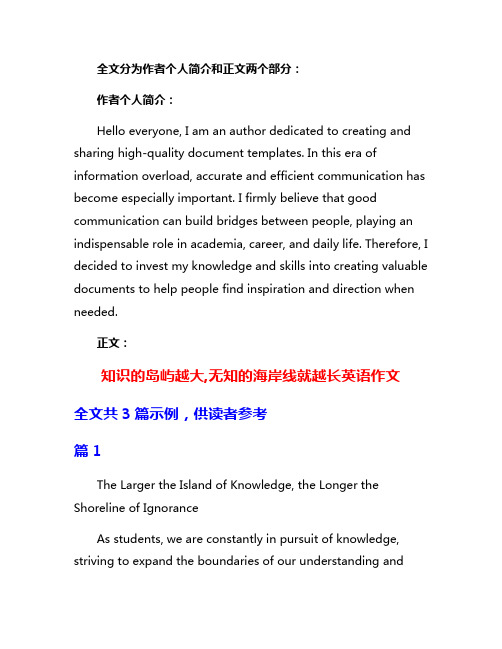
全文分为作者个人简介和正文两个部分:作者个人简介:Hello everyone, I am an author dedicated to creating and sharing high-quality document templates. In this era of information overload, accurate and efficient communication has become especially important. I firmly believe that good communication can build bridges between people, playing an indispensable role in academia, career, and daily life. Therefore, I decided to invest my knowledge and skills into creating valuable documents to help people find inspiration and direction when needed.正文:知识的岛屿越大,无知的海岸线就越长英语作文全文共3篇示例,供读者参考篇1The Larger the Island of Knowledge, the Longer the Shoreline of IgnoranceAs students, we are constantly in pursuit of knowledge, striving to expand the boundaries of our understanding andunravel the mysteries that surround us. However, the more we learn, the more we realize how vast the ocean of ignorance truly is. This paradoxical relationship between knowledge and ignorance is aptly captured in the phrase, "The larger the island of knowledge, the longer the shoreline of ignorance."At the outset of our academic journey, we are like explorers venturing into uncharted territories, armed with a sense of curiosity and a thirst for discovery. The world around us is a tapestry of unanswered questions, and each new piece of information we acquire is akin to a small pebble added to the island of our knowledge. With every lesson learned, every concept mastered, and every theory grasped, we feel a sense of accomplishment, as if we have conquered a new frontier.Yet, as our island of knowledge grows, so too does our awareness of the vast expanse of ignorance that surrounds it. With each new discovery, we uncover a multitude of new questions, each one beckoning us to explore further. It is as if the shoreline of our island extends infinitely, revealing new horizons of inquiry and inviting us to venture into the depths of the unknown.This realization can be both exhilarating and humbling. On one hand, it ignites within us a passionate desire to push theboundaries of our understanding, to dive into the depths of unexplored realms, and to contribute to the ever-expanding body of human knowledge. We are driven by an insatiable curiosity, a hunger for intellectual stimulation, and a desire to make our mark on the world through our discoveries and insights.On the other hand, the vastness of our ignorance can be daunting, reminding us of the limitations of our finite minds and the sheer immensity of the universe we inhabit. We are confronted with the sobering truth that no matter how much we learn, there will always be more to uncover, more mysteries to solve, and more questions to ponder.This dichotomy between knowledge and ignorance is not a cause for despair, but rather a testament to the beauty and complexity of the world we inhabit. It is a reminder that learning is a lifelong journey, one that demands humility, perseverance, and an unwavering commitment to intellectual growth.As students, we must embrace this paradox and allow it to fuel our quest for understanding. We must approach each new lesson with an open mind, recognizing that what we learn today may be challenged or refined by the discoveries of tomorrow. We must cultivate a spirit of intellectual curiosity, always seekingto probe deeper, to question assumptions, and to explore alternative perspectives.Furthermore, we must celebrate the collective nature of human knowledge, recognizing that no individual can possibly possess all the answers. We stand on the shoulders of giants, building upon the foundations laid by countless scholars, scientists, and thinkers who have come before us. It is through collaboration, cross-pollination of ideas, and the sharing of discoveries that we can truly push the boundaries of our understanding.The journey of knowledge is one that is never truly complete, for with each answer we uncover, a multitude of new questions emerge. Yet, it is this very journey that makes the pursuit of learning so exhilarating and fulfilling. As students, we have the privilege and responsibility to embrace this paradox, to revel in the joys of discovery while humbly acknowledging the vast oceans of ignorance that surround us.So let us dive into the depths of our curiosity, let us explore the uncharted territories of knowledge, and let us embrace the ever-expanding shoreline of ignorance. For it is in this endless cycle of learning and questioning that we find the true essenceof intellectual growth and the profound beauty of the human experience.篇2The Bigger the Island of Knowledge, the Longer the Shoreline of IgnoranceEver since I was a little kid, I've been fascinated by the vast unknown. Looking up at the night sky, I was in awe of the twinkling stars and the mysteries they held. As I grew older and began learning more in school, my childlike wonder evolved into an intellectual curiosity about the depths of human knowledge. It was in one of my philosophy classes that I first encountered the profound metaphor: "The bigger the island of knowledge, the longer the shoreline of ignorance." This idea resonated deeply with me and has continued to shape my perspective on learning and the pursuit of understanding.On the surface, the metaphor seems almost paradoxical. How can gaining more knowledge lead to increased ignorance? The answer lies in the nature of discovery itself. As we expand the boundaries of what is known, we invariably encounter new frontiers of the unknown. Much like an island's shoreline grows longer as its land mass increases, our awareness of the vastoceans of ignorance surrounding us expands in tandem with our acquisitions of knowledge.When I was a young student, my world of knowledge felt like a small, isolated island. The subjects I studied in elementary school – basic math, reading, writing, and science – were confined and well-defined. I could see the limits of my understanding, the shorelines were clear and close. However, as I progressed through my education, venturing into more advanced topics and specialized fields, the island grew. I learned about ancient civilizations, complex mathematical theories, intricate biological processes, and profound philosophical concepts. With each new discovery, novel fields of inquiry unveiled themselves, and the shorelines stretched further into the distance.It's a humbling realization that no matter how much we learn, there will always be an endless expanse of ignorance surrounding us. The more we know, the more we become aware of how much we don't know. This is not a cause for despair, however, but rather a testament to the boundless potential for growth and exploration that lies before us.One of the most exhilarating aspects of this metaphor is the implication that our journey of learning is never-ending. As wetraverse the shorelines of our current knowledge, venturing into the uncharted waters of ignorance, we inevitably discover new islands, new realms of understanding to explore and incorporate into our ever-expanding archipelago of knowledge.This process is not limited to the realm of academia or scientific endeavors; it permeates all facets of human experience. Every time we encounter a new culture, engage with a different perspective, or confront a complex challenge, we are presented with opportunities to expand our islands of knowledge and, consequently, reveal new shorelines of ignorance.The metaphor also serves as a potent reminder to approach knowledge with humility and an open mind. It would be folly to assume that our current understanding, no matter how vast, encompasses the entirety of truth or reality. There will always be aspects of the world, the universe, and the human experience that elude our comprehension, at least for the time being.As students, we must embrace this concept wholeheartedly. It is a call to maintain a sense of wonder, curiosity, and a thirst for learning that extends beyond the confines of our current curriculums or fields of study. We must be willing to question assumptions, challenge established paradigms, and venture intouncharted intellectual territories, for it is in those unexplored regions that the greatest discoveries and insights await.Furthermore, this metaphor encourages us to cultivate a sense of intellectual humility and respect for the perspectives and knowledge of others. Just as our individual islands of knowledge are surrounded by vast oceans of ignorance, so too are the collective islands of human understanding dwarfed by the enormity of the unknown. By recognizing the inherent limitations of our individual perspectives and embracing the diversity of knowledge and experiences that others bring to the table, we can collectively navigate the shorelines of ignorance more effectively.In practical terms, this metaphor can serve as a guiding principle for our approach to learning and problem-solving. When confronted with a complex issue or a gap in our understanding, we should not shy away from the discomfort of ignorance. Instead, we should embrace it as an opportunity to expand our knowledge, to venture beyond the familiar shorelines and explore the uncharted waters that lie beyond.This mindset fosters a culture of intellectual curiosity, critical thinking, and a willingness to challenge preconceived notions. It encourages us to ask probing questions, seek out diverseperspectives, and engage in respectful discourse and debate. By doing so, we not only expand our individual islands of knowledge but also contribute to the collective growth of human understanding.Ultimately, the metaphor of "the bigger the island of knowledge, the longer the shoreline of ignorance" is a profound and empowering concept that should shape our approach to learning and intellectual growth. It reminds us to embrace the vastness of the unknown with humility, curiosity, and a relentless pursuit of understanding. It challenges us to venture beyond the familiar shores, to explore new frontiers of knowledge, and to contribute to the collective expansion of human understanding.As students, we stand at the precipice of a boundless ocean of ignorance, with the opportunity to chart new intellectual territories and discover uncharted islands of knowledge. Let us embrace this metaphor as a guiding principle, a call to lifelong learning and intellectual exploration, and a testament to the endless potential that lies within the human spirit.篇3The Island of Knowledge and the Shoreline of IgnoranceAs a student, I often feel like I'm on a constant journey of exploration, sailing across vast seas of information in search of knowledge. Each new subject I delve into is like an uncharted island waiting to be discovered and understood. But as I've learned more and more, a peculiar pattern has emerged – the more I know, the more I realize how much I don't know. It's as if the island of my knowledge is surrounded by an ever-expanding shoreline of ignorance.When I was younger, the world seemed so simple. The islands of knowledge felt tiny and isolated, surrounded by seemingly endless oceans of the unknown. I remember learning basic facts about animals, planets, and historical events, feeling like I had a pretty good grasp on how everything worked. But as I grew older and my education progressed, those once-tiny islands began to merge and expand, revealing just how vast the realm of human understanding truly is.Take science, for instance. In primary school, science was a straightforward affair – we learned about the basic states of matter, the planets in our solar system, and perhaps did a few simple experiments with vinegar and baking soda. At that point, the "island" of scientific knowledge felt relatively small andself-contained. But as I advanced through secondary school andinto university-level coursework, that modest islet rapidly transformed into a sprawling archipelago of interconnected disciplines.Suddenly, I found myself grappling with complex concepts like quantum mechanics, evolutionary biology, and biochemistry. The more I studied, the more I realized how little I truly understood about the intricate workings of the universe. Each new discovery seemed to uncover a dozen more unanswered questions, like an ever-expanding fractal pattern of uncertainty.And it's not just the sciences that exemplify this phenomenon. The same principle holds true across all academic domains. In literature, for instance, I might have started with simple children's books and fables, only to eventually encounter the rich tapestries of symbolism and metaphor woven into the great novels and poems of human history. The island of literary knowledge, which once felt so simple and straightforward, revealed layers upon layers of nuance and interpretation the deeper I ventured.The truth is, the more we learn, the more we're forced to confront the boundaries of our understanding. With each new piece of knowledge we acquire, we're effectively redrawing the maps of what we know and don't know. The islands ofcomprehension may grow larger and more interconnected, but their sprawling shorelines only serve to highlight the vast, unexplored waters that still lie beyond.This realization can be both humbling and deeply motivating. On one hand, it's a stark reminder of the limitations of human intellect and the sheer scale of all that remains to be discovered. No matter how much we study and learn, there will always be more questions than answers, more mysteries to unravel.But at the same time, this ever-expanding shoreline of ignorance is what drives the relentless pursuit of knowledge forward. It's what inspires scientists to scour the depths of the oceans and the farthest reaches of the cosmos for new insights. It's what compels philosophers and thinkers to continually reexamine and refine the foundations of human understanding. The unknown isn't a barrier – it's an invitation to explore, to sail forth into uncharted waters and claim new lands of comprehension.As a student, this perspective has been invaluable in shaping my approach to learning. I've come to understand that true wisdom isn't about accumulating facts and figures, but about cultivating a deep sense of humility and curiosity. It's about recognizing that the more we know, the more we realize howlittle we truly understand about the complexities of the world around us.So while the island of my knowledge may continue to grow and evolve, I've learned to embrace the ever-lengthening shoreline of ignorance that surrounds it. For it is in those vast, unexplored waters that the greatest opportunities for discovery and growth lie. Each unanswered question is a siren call, beckoning me to set sail once more in search of new lands to claim, new horizons to conquer.The journey of learning is an endless one, with no final destination in sight. But that's precisely what makes it so exhilarating and rewarding. As long as the shoreline of ignorance continues to stretch out before us, there will always be new frontiers to explore, new mysteries to unravel, and new islands of knowledge to claim as our own.。
2022年考研英语一真题及答案解析
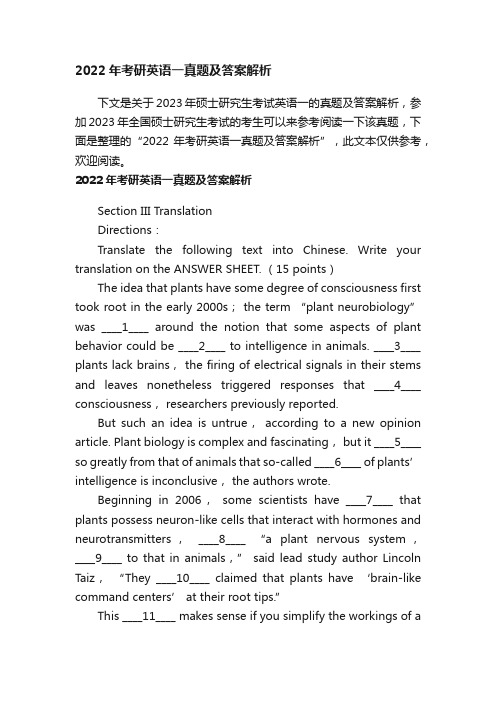
2022年考研英语一真题及答案解析下文是关于2023年硕士研究生考试英语一的真题及答案解析,参加2023年全国硕士研究生考试的考生可以来参考阅读一下该真题,下面是整理的“2022年考研英语一真题及答案解析”,此文本仅供参考,欢迎阅读。
2022年考研英语一真题及答案解析Section III TranslationDirections:Translate the following text into Chinese. Write your translation on the ANSWER SHEET. (15 points)The idea that plants have some degree of consciousness first took root in the early 2000s;the term “plant neurobiology” was ____1____ around the notion that some aspects of plant behavior could be ____2____ to intelligence in animals. ____3____ plants lack brains, the firing of electrical signals in their stems and leaves nonetheless triggered responses that ____4____ consciousness, researchers previously reported.But such an idea is untrue,according to a new opinion article. Plant biology is complex and fascinating, but it ____5____ so greatly from that of animals that so-called ____6____ of plants’ intelligence is inconclusive, the authors wrote.Beginning in 2006,some scientists have ____7____ that plants possess neuron-like cells that interact with hormones and neurotransmitters,____8____ “a plant nervous system,____9____ to that in animals,” said lead study author Lincoln Taiz,“They ____10____ claimed that plants have ‘brain-like command centers’ at their root tips.”This ____11____ makes sense if you simplify the workings of acomplex brain,____12____ it to an array of electrical pulses;cells in plants also communicate through electrical signals. ____13____, the signaling in a plant is only ____14____ similar to the firing in a complex animal brain,which is more than “a mass of cells that communicate by electricity,” Taiz said.“For consciousness to evolve,a brain with a threshold ____15____ of complexity and capacity is required,” he ____16____.” Since plants don’t have nervous systems,the ____17____ that they have consciousness are effectively zero.”And what’s so great about consciousness,anyway?Plants can’t run away from ____18____, so investing energy in a body system which ____19____ a threat and can feel pain would be a very ____20____ evolutionary strategy,according to the article.1. [A] coined [B] discovered [C] collected [D] issued2. [A] attributed [B] directed [C] compared [D] confined3. [A] Unless [B] When [C] Once [D] Though4. [A] coped with [B] consisted of [C] hinted at [D] extended to5. [A] suffers [B] benefits [C] develops [D] differs6. [A] acceptance [B] evidence [C] cultivation [D] creation7. [A] doubted [B] denied [C] argued [D] requested8. [A] adapting [B] forming [C] repairing [D] testing9. [A] analogous [B] essential [C] suitable [D] sensitive10. [A] just [B] ever [C] still [D] even11. [A] restriction [B] experiment [C] perspective [D] demand12. [A] attaching [B] reducing [C] returning [D] exposing13. [A] However [B] Moreover [C] Therefore [D] Otherwise14. [A] temporarily [B] literally [C] superficially [D] imaginarily15. [A] list [B] level [C] label [D] load16. [A] recalled [B] agreed [C] questioned [D] added17. [A] chances [B] risks [C] excuses [D] assumptions18. [A] danger [B] failure [C] warning [D] control19. [A] represents [B] includes [C] reveals [D] recognizes20. [A] humble [B] poor [C] practical [D] easy答案解析:1. [A] coined2. [C] compared3. [D] Though4. [C] hinted at5. [D] differs6. [B] evidence7. [C] argued8. [B] forming9. [A] analogous10. [D] even11. [C] perspective12. [B] reducing13. [A] However14. [C] superficially15. [B] level16. [D] added17. [A] chances18. [A] danger19. [D] recognizes20. [B] poor阅读理解Section II Reading ComprehensionPart ADirections:Read the following four texts. Answer the questions after each text by choosing A, B, C or D. Mark your answers on the ANSWER SHEET. (40 points)Text 1People often complain that plastics are too durable. Water bottles,shopping bags,and other trash litter the planet,from Mount Everest to the Mariana Trench, because plastics are everywhere and don’t break down easily. But some plastic materials change over time. They crack and frizzle. They “weep” out additives. They melt into sludge. All of which creates huge headaches for institutions,such as museums,trying to preserve culturally important objects. The variety of plastic objects at risk is dizzying: early radios, avant-garde sculptures,celluloid animation stills from Disney films,the first artificial heart.Certain artifacts are especially vulnerable because some pioneers in plastic art didn’t always know how to mix ingredients properly,says Thea van Oosten, a polymer chemist who,until retiring a few years ago,worked for decades at the Cultural Heritage Agency of the Netherlands. “It’s like baking a cake:If you don’t have exact amounts,it goes wrong,” she says. “The object you make is already a time bomb.”And sometimes,it’s not the artist’s fault. In the 1960s,the Italian artist Piero Gilardi began to create hundreds of bright,colorful foam pieces. Those pieces included small beds of roses and other items as well as a few dozen “nature carpets”—large rectangles decorated with foam pumpkins,cabbages,and watermelons. He wanted viewers to walk around on the carpets—which meant they had to be durable.Unfortunately, the polyurethane foam he used is inherently unstable. It’s especially vulnerable to light damage, and by the mid-1990s,Gilardi’s pumpkins,roses,and other figures were splitting and crumbling. Museums locked some of them away in the dark.So van Oosten and her colleagues worked to preserve Gilardi’s sculptures. They infused some with stabilizing and consolidating chemicals. Van Oosten calls those chemicals “sunscreens” because their goal was to prevent further light damage and rebuild worn polymer fibers. She is proud that several sculptures have even gone on display again,albeit sometimes beneath protective cases.Despite success stories like van Oosten’s, preservation of plastics will likely get harder. Old objects continue to deteriorate. Worse, biodegradable plastics, designed to disintegrate, are increasingly common.And more is at stake here than individual objects. Joana Lia Ferreira, an assistant professor of conservation and restoration at the NOVA School of Science and Technology,notes that archaeologists first defined the great material ages of human history—Stone Age,Iron Age,and so on—after examining artifacts in museums. We now live in an age of plastic, she says,“and what we decide to collect today,what we decide to preserve … will have a strong impact on how in the future we’ll be seen.”21. According to Paragraph 1,museums are faced with difficulties in ______.[A] maintaining their plastic items[B] obtaining durable plastic artifacts[C] handling outdated plastic exhibits[D] classifying their plastic collections22. Van Oosten believes that certain plastic objects are ______.[A] immune to decay[B] improperly shaped[C] inherently flawed[D] complex in structure23. Museums stopped exhibiting some of Gilardi’s artworks to ______.[A] keep them from hurting visitors[B] duplicate them for future display[C] have their ingredients analyzed[D] prevent them from further damage24. The author thinks that preservation of plastics is ______.[A] costly[B] unworthy[C] unpopular[D] challenging25. In Ferreira’ s opinion, preservation of plastic artifacts ______.[A] will inspire future scientific research[B] has profound historical significance[C] will help us separate the material ages[D] has an impact on today’s cultural lifeSection II Reading Comprehension答案解析:21. [A] maintaining their plastic items22. [C] inherently flawed23. [D] prevent them from further damage24. [D] challenging25. [B] has profound historical significanceText 2As the latest crop of students pen their undergraduate application form and weigh up their options, it may be worth considering just how the point, purpose and value of a degree has changed and what Generation Z need to consider as they start the third stage of their educational journey.Millennials were told that if you did well in school, got a decent degree, you would be set up for life. But that promise has been found wanting. As degrees became universal,they became devalued. Education was no longer a secure route of social mobility. T oday, 28 per cent of graduates in the UK are in non-graduate roles, a percentage which is double the average among OECD countries.This is not to say that there is no point in getting a degree,but rather stress that a degree is not for everyone,that the switch from classroom to lecture hall is not an inevitable one and that other options are available.Thankfully, there are signs that this is already happening,with Generation Z seeking to learn from their millennial predecessors, even if parents and teachers tend to be still set in the degree mindset. Employers have long seen the advantages of hiring school leavers who often prove themselves to be more committed and loyal employees than graduates. Many too are seeing the advantages of scrapping a degree requirement for certain roles.For those for whom a degree is the desired route, consider that this may well be the first of many. In this age of generalists,it pays to have specific knowledge or skills. Postgraduates now earn 40 per cent more than graduates. When more and more of us have a degree, it makes sense to have two.It is unlikely that Generation Z will be done with education at 18 or 21; they will need to be constantly up-skilling throughout their career to stay employable. It has been estimated that this generation, due to the pressures of technology, the wish for personal fulfilment and desire for diversity,will work for 17 different employers over the course of their working life and have five different careers. Education, and not just knowledge gained on campus,will be a core part of Generation Z’s career trajectory.Older generations often talk about their degree in the present and personal tense:‘I am a geographer’ or ‘I am a classist’. Their sons or daughters would never say such a thing;it’s as if they already know that their degree won’t define them in the same way.26. The author suggests that Generation Z should ______.[A] be careful in choosing a college[B] be diligent at each educational stage[C] reassess the necessity of college education[D] postpone their undergraduate application27. The percentage of UK graduates in non-graduate roles reflect ______.[A] Millennial’s opinions about work[B] the shrinking value of a degree[C] public discontent with education[D] the desired route of social mobility28. The author considers it a good sign that ______.[A] Generation Z are seeking to earn a decent degree[B] school leavers are willing to be skilled workers[C] employers are taking a realistic attitude to degrees[D] parents are changing their minds about education29. It is advised in Paragraph 5 that those with one degree should ______.[A] make an early decision on their career[B] attend on the job training programs[C] team up with high-paid postgraduates[D] further their studies in a specific field30. What can be concluded about Generation Z from the last two paragraphs?[A] Lifelong learning will define them.[B] They will make qualified educators.[C] Degrees will no longer appeal them.[D] They will have a limited choice of jobs.答案解析:26. [C] reassess the necessity of college education27. [B] the shrinking value of a degree28. [C] employers are taking a realistic attitude to degrees29. [D] further their studies in a specific field30. [A] Lifelong learning will define them.Text 3Enlightening, challenging, stimulating, fun. These were some of the words that Nature readers used to describe their experience of art-science collaborations in a series of articles on partnerships between artists and researchers. Nearly 40% of the roughly 350 people who responded to an accompanying poll said they had collaborated with artists; and almost all said they would consider doing so in future.Such an encouraging result is not surprising. Scientists are increasingly seeking out visual artists to help them communicate their work to new audiences. “Artists help scientists reach a broader audience and make emotional connections that enhancelearning.” One respondent said.One example of how artists and scientists have together rocked the senses came last month when the Sydney Symphony Orchestra performed a reworked version of Antonio Vivaldi’s The Four Seasons. They reimagined the 300-year-old score by injecting the latest climate prediction data for each season—provided by Monash University’s Climate Change Communication Research Hub. The performance was a creative call to action ahead of November’s United Nations Climate Change Conference in Glasgow, UK.But a genuine partnership must be a two-way street. Fewer artists than scientists responded to the Nature poll; however,several respondents noted that artists do not simply assist scientists with their communication requirements. Nor should their work be considered only as an object of study. The alliances are most valuable when scientists and artists have a shared stake in a project, are able to jointly design it and can critique each other’s work. Such an approach can both prompt new research as well as result in powerful art.More than half a century ago, the Massachusetts Institute of Technology opened its Center for Advanced Visual Studies (CAVS)to explore the role of technology in culture. The founders deliberately focused their projects around light—hence the “visual studies” in the name. Light was a something that both artists and scientists had an interest in,and therefore could form the basis of collaboration. As science and technology progressed, and divided into more sub-disciplines, the centre was simultaneously looking to a time when leading researchers could also be artists, writers and poets, and vice versa.Nature’s poll findings suggest that this trend is as strong asever, but, to make a collaboration work, both sides need to invest time, and embrace surprise and challenge. The reach of art-science tie-ups need to go beyond the necessary purpose of research communication, and participants must not fall into the trap of stereotyping each other. Artists and scientists alike are immersed in discovery and invention,and challenge and critique are core to both, too.31. According to Paragraph 1,art-science collaborations have ______.[A] caught the attention of critics[B] received favorable responses[C] promoted academic publishing[D] sparked heated public disputes32. The reworked version of The Four Seasons is mentioned to show that ______.[A] art can offer audiences easy access to science[B] science can help with the expression of emotions[C] public participation in science has a promising future[D] art is effective in facilitating scientific innovations33. Some artists seem to worry about in the art-science partnership ______.[A] their role may be underestimated[B] their reputation may be impaired[C] their creativity may be inhibited[D] their work may be misguided34. What does the author say about CAVS?[A] It was headed alternately by artists and scientists.[B] It exemplified valuable art-science alliances.[C] Its projects aimed at advancing visual studies.[D] Its founders sought to raise the status of artists.35. In the last paragraph, the author holds that art-science collaborations ______.[A] are likely to go beyond public expectations[B] will intensify interdisciplinary competition[C] should do more than communicating science[D] are becoming more popular than before答案解析:31. [B] received favorable responses32. [A] art can offer audiences easy access to science33. [A] their role may be underestimated34. [B] It exemplified the valuable art-science alliances.35. [C] should do more than communicating scienceText 4The personal grievance provisions of New Zealand’s Employment Relations Act 2000 (ERA)prevent an employer from firing an employee without good cause. Instead,dismissals must be justified. Employers must both show cause and act in a procedurally fair way.Personal grievance procedures were designed to guard the jobs of ordinary workers from “unjustified dismissals”. The premise was that the common law of contract lacked sufficient safeguards for workers against arbitrary conduct by management. Long gone are the days when a boss could simply give an employee contractual notice.But these provisions create difficulties for businesses when applied to highly paid managers and executives. As countless boards and business owners will attest, constraining firms from firing poorly performing,high-earning managers is a handbrake on boosting productivity and overall performance. The difference between C-grade and A-grade managers mayvery well be the difference between business success or failure. Between preserving the jobs of ordinary workers or losing them. Yet mediocrity is no longer enough to justify a dismissal.Consequently—and paradoxically—laws introduced to protect the jobs of ordinary workers may be placing those jobs at risk.If not placing jobs at risk,to the extent employment protection laws constrain business owners from dismissing under-performing managers, those laws act as a constraint on firm productivity and therefore on workers’ wages. Indeed, in “An International Perspective on New Zealand’s Productivity Paradox” (2014), the Productivity Commission singled out the low quality of managerial capabilities as a cause of the country’s poo r productivity growth record.Nor are highly paid managers themselves immune from the harm caused by the ERA’s unjustified dismissal procedures. Because employment protection laws make it costlier to fire an employee, employers are more cautious about hiring new staff. This makes it harder for the marginal manager to gain employment. And firms pay staff less because firms carry the burden of the employment arrangement going wrong.Society also suffers from excessive employment protections. Stringent job dismissal regulations adversely affect productivity growth and hamper both prosperity and overall well-being.Across the Tasman Sea, Australia deals with the unjustified dismissal paradox by excluding employees earning above a specified “high-income threshold” from the protection of its unfair dismissal laws. In New Zealand,a 2016 private members’ Bill tried to permit firms and high-income employees to contract out of the unjustified dismissal regime. However,themechanisms proposed were unwieldy and the Bill was voted down following the change in government later that year.36. The personal grievance provisions of the ERA are intended to ______.[A] punish dubious corporate practices[B] improve traditional hiring procedures[C] exempt employers from certain duties[D] protect the rights of ordinary workers37. It can be learned from paragraph 3 that the provisions may ______.[A] hinder business development[B] undermine managers’ authority[C] affect the public image of the firms[D] worsen labor-management relations38. Which of the following measures would the Productivity Commission support?[A] Imposing reasonable wage restraints.[B] Enforcing employment protection laws.[C] Limiting the powers of business owners.[D] Dismissing poorly performing managers.39. What might be an effect of ERA’s unjustified dismissal procedures?[A] Highly paid managers lose their jobs.[B] Employees suffer from salary cuts.[C] Society sees a rise in overall well-being.[D] Employers need to hire new staff.40. It can be i nferred that the “high-income threshold” in Australia ______.[A] has secured managers’ earnings[B] has produced undesired results[C] is beneficial to business owners[D] is difficult to put into practice答案解析:36. [D] protect the rights of ordinary workers37. [A] hinder business development38. [D] Dismissing poorly performing managers.39. [B] Employees suffer from salary cuts.40. [D] is difficult to put into practiceSection II Reading ComprehensionPart B题目要求暂无,需要考生总结人物观点然后选择正确选项,类似英语二信息匹配题。
获取知识的过程比知识本身更重要英语作文

The Journey of Acquisition: More Preciousthan the DestinationIn the realm of knowledge, the quest for wisdom often outshines the wisdom itself. The process of acquiring knowledge, a labyrinthine journey that demands curiosity, perseverance, and an open mind, is often more valuable than the knowledge itself. This assertion holds true not only in academic pursuits but also in the day-to-day experiences of life.The allure of knowledge lies not just in the facts and figures but in the exploration of ideas, the challenges faced, and the lessons learned. Each step of the journey, whether it's a eureka moment or a frustrating dead end, contributes to our growth and understanding. The process itself is an education, shaping our perspectives and equipping us with the tools necessary to navigate the complexities of the world.Moreover, the process of acquiring knowledge isiterative and ongoing. It's a dynamic dance between curiosity and discovery, where new information challenges old beliefs, and vice versa. This continuous cycle oflearning and unlearning is crucial for intellectual growth and the cultivation of critical thinking skills.In the academic world, the process of acquiring knowledge is often more rewarding than simply absorbing facts. The journey involves delving into texts, engaging with peers, and thinking critically about the information presented. This active engagement with knowledge not only enhances comprehension but also fosters a deeper understanding of the subject matter.Outside the classroom, the process of acquiring knowledge is equally, if not more, important. It involves trial and error, experimentation, and the embrace of uncertainty. This process, often messy and unpredictable,is vital for personal growth and the development of resilience. It teaches us to be adaptable, resourceful, and innovative in the face of challenges.Additionally, the process of acquiring knowledge is often more enjoyable than the destination itself. The journey is filled with surprises, insights, and moments of clarity that make the pursuit of knowledge an exciting and rewarding adventure. The sense of accomplishment andfulfillment derived from this process is often more satisfying than simply acquiring the knowledge itself.In conclusion, the process of acquiring knowledge is more precious than the knowledge itself. It is a transformative experience that shapes our perspectives, enhances our understanding, and fosters personal growth.The journey, filled with challenges, insights, and momentsof discovery, is an adventure that is both rewarding and enjoyable. As we embark on this journey, we must cherishthe process and embrace the unknown, as it is through this process that we truly learn and grow.**获取知识之旅:比终点更重要**在知识的领域中,对智慧的追求往往比智慧本身更加耀眼。
认识是从书本上还是实践中得到的英语作文
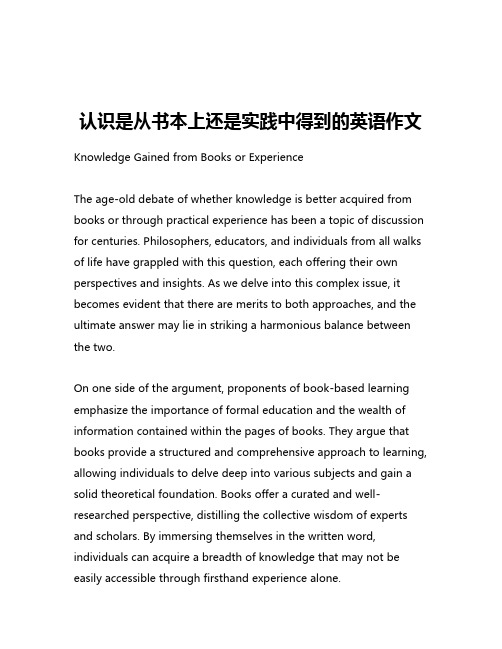
认识是从书本上还是实践中得到的英语作文Knowledge Gained from Books or ExperienceThe age-old debate of whether knowledge is better acquired from books or through practical experience has been a topic of discussion for centuries. Philosophers, educators, and individuals from all walks of life have grappled with this question, each offering their own perspectives and insights. As we delve into this complex issue, it becomes evident that there are merits to both approaches, and the ultimate answer may lie in striking a harmonious balance between the two.On one side of the argument, proponents of book-based learning emphasize the importance of formal education and the wealth of information contained within the pages of books. They argue that books provide a structured and comprehensive approach to learning, allowing individuals to delve deep into various subjects and gain a solid theoretical foundation. Books offer a curated and well-researched perspective, distilling the collective wisdom of experts and scholars. By immersing themselves in the written word, individuals can acquire a breadth of knowledge that may not be easily accessible through firsthand experience alone.Advocates of book-based learning often point to the efficiency and accessibility of this approach. Books are readily available, and individuals can study at their own pace, revisiting and reinforcing concepts as needed. This structured learning environment allows for the systematic acquisition of knowledge, ensuring that foundational principles are firmly grasped before moving on to more complex ideas. Moreover, books provide a platform for the dissemination of knowledge across time and space, enabling the preservation and transmission of human understanding from one generation to the next.Furthermore, book-based learning offers the advantage of allowing individuals to learn from the experiences and insights of others. Through the written word, readers can gain access to a diverse range of perspectives, theories, and case studies, broadening their understanding of the world. This exposure to a vast array of information and ideas can stimulate critical thinking, encourage the exploration of alternative viewpoints, and foster a deeper appreciation for the complexities of various fields of study.On the other hand, advocates of experiential learning emphasize the value of practical, hands-on experience in the acquisition of knowledge. They argue that while books provide a solid theoretical foundation, true understanding and mastery of a subject can only beachieved through direct engagement and application of knowledge in real-world settings. Practical experience allows individuals to develop a deeper, more nuanced understanding of concepts, as they grapple with the challenges and nuances that arise in actual situations.Proponents of experiential learning often highlight the importance of developing problem-solving skills, adaptability, and the ability to navigate ambiguity. When faced with real-world problems, individuals are forced to think critically, draw upon their knowledge, and devise innovative solutions. This process of trial and error, coupled with the opportunity to learn from mistakes, can lead to a more profound and lasting understanding of the subject matter.Moreover, practical experience fosters the development of valuable soft skills, such as communication, teamwork, and leadership, which are essential for success in various professional and personal endeavors. These skills are often difficult to cultivate solely through book-based learning, as they require the application of knowledge in dynamic, interpersonal settings.Ultimately, the debate between book-based learning and experiential learning is not one of mutually exclusive options, but rather a recognition of the complementary nature of these two approaches. The most effective learning experiences often involve ablend of theoretical knowledge and practical application, allowing individuals to develop a comprehensive understanding of the subject matter.In an ideal educational landscape, a balance between these two modes of learning would be struck, with book-based instruction providing the foundational knowledge and experiential learning opportunities enhancing the practical application and deeper understanding of that knowledge. This synergistic approach would enable individuals to develop a well-rounded set of skills and competencies, equipping them to navigate the complexities of the modern world.As we continue to grapple with this age-old debate, it is essential to recognize that both book-based learning and experiential learning have their unique merits and that the true value lies in finding the right balance and integration of these complementary approaches. By embracing this holistic perspective, we can empower individuals to become lifelong learners, capable of drawing upon the wealth of knowledge available in books and the invaluable insights gained through real-world experiences.。
学问见识才能三者关系英语作文

学问见识才能三者关系英语作文Knowledge, Wisdom, and Competence: An Interplay of Intellectual Virtues.In the pursuit of intellectual enlightenment, three indispensable virtues emerge as the cornerstones of our cognitive development: knowledge, wisdom, and competence. While often perceived as distinct entities, these virtues are intricately intertwined, forming a synergistic matrix that empowers us to comprehend, navigate, and shape the world around us.Knowledge: The Foundation of Understanding.Knowledge, in its most basic sense, refers to the acquisition and accumulation of information. It encompasses facts, theories, principles, and concepts drawn from diverse disciplines and experiences. Knowledge expands our horizons, enabling us to understand the complexities of our surroundings and the interconnectedness of all things. Itserves as the raw material upon which our intellectual endeavors are built.However, mere possession of knowledge does not equate to intellectual depth or maturity. Knowledge must be critically analyzed, synthesized, and applied to be truly transformative. This is where wisdom comes into play.Wisdom: The Guiding Light of Judgment.Wisdom, a higher-order cognitive faculty, is theability to discern the significance of knowledge and apply it to real-world situations. It involves the capacity to make sound judgments, to recognize patterns, to anticipate consequences, and to balance competing perspectives. Wisdom is not merely theoretical but practical, guiding our actions and decisions in a manner that promotes both individual well-being and the greater good.While knowledge provides the building blocks of intellectual inquiry, wisdom furnishes us with the compass to navigate the complexities of life. It allows us todistinguish between superficial and profound knowledge, to prioritize our values, and to make informed choices that resonate with our deepest principles.Competence: The Embodiment of Expertise.Competence, the third pillar of intellectual development, manifests as the ability to effectively apply knowledge and wisdom in specific domains. It involves the mastery of skills, techniques, and methodologies that enable us to perform tasks with proficiency and efficiency. Competent individuals possess the necessary cognitive, technical, and interpersonal abilities to excel in their chosen fields of endeavor.Competence is not merely the accumulation of technical expertise but also the cultivation of intellectualflexibility and adaptability. It allows us to transfer knowledge and skills across domains, to innovate and devise creative solutions, and to respond effectively to unforeseen challenges.The Interplay of Virtues.The interplay between knowledge, wisdom, and competence is a dynamic and mutually reinforcing process. Knowledge provides the foundational understanding that informs wisdom, which in turn guides the development of competence. Conversely, competence sharpens our intellect by requiring us to apply knowledge and wisdom in practical settings, thereby deepening our understanding and expanding our knowledge base.This virtuous cycle empowers us to continuously growand evolve intellectually. As we acquire new knowledge, our wisdom deepens, and our competence expands accordingly.This enables us to engage with the world with greater insight, effectiveness, and ethical sensitivity.Conclusion.Knowledge, wisdom, and competence are essential virtues for navigating the complexities of the 21st century. By cultivating these virtues, we develop the intellectualcapacity to comprehend our world, to make informed decisions, and to act with competence and purpose. They are not merely cognitive tools but fundamental attributes that shape our character and empower us to lead fulfilling and meaningful lives.。
获取知识的过程比知识本身更重要英语作文
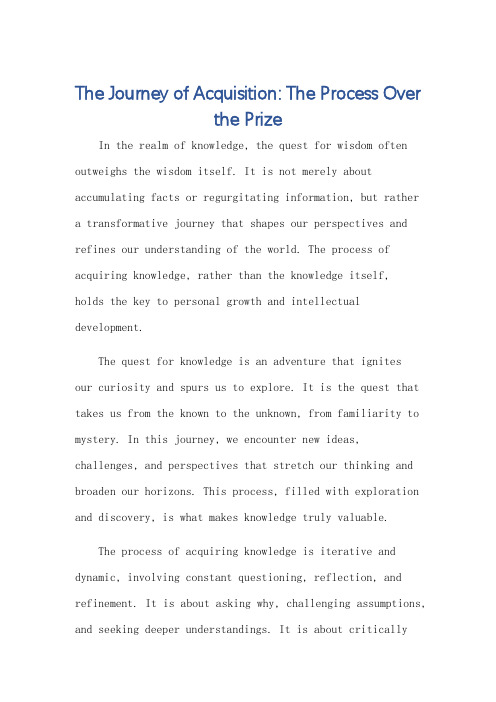
The Journey of Acquisition: The Process Overthe PrizeIn the realm of knowledge, the quest for wisdom often outweighs the wisdom itself. It is not merely about accumulating facts or regurgitating information, but rather a transformative journey that shapes our perspectives and refines our understanding of the world. The process of acquiring knowledge, rather than the knowledge itself,holds the key to personal growth and intellectual development.The quest for knowledge is an adventure that ignitesour curiosity and spurs us to explore. It is the quest that takes us from the known to the unknown, from familiarity to mystery. In this journey, we encounter new ideas, challenges, and perspectives that stretch our thinking and broaden our horizons. This process, filled with exploration and discovery, is what makes knowledge truly valuable.The process of acquiring knowledge is iterative and dynamic, involving constant questioning, reflection, and refinement. It is about asking why, challenging assumptions, and seeking deeper understandings. It is about criticallyexamining information, weighing evidence, and making informed decisions. This iterative process not only enhances our understanding of a subject but also cultivates our critical thinking and problem-solving skills.Moreover, the process of acquiring knowledge is often more rewarding than the knowledge itself. The sense of accomplishment and growth that comes from overcoming challenges, understanding complex concepts, and piecing together information is invaluable. The journey, filled with ups and downs, triumphs and failures, is what truly shapes our character and defines our intellectual capabilities.Additionally, the process of acquiring knowledge is collaborative and shared. It involves seeking wisdom from others, engaging in discussions, and collaborating with peers. This collaborative process not only enhances our understanding but also fosters a sense of community and belonging. It is through this process that we learn to appreciate diverse perspectives, embrace diversity, and work towards common goals.In conclusion, while knowledge itself is indeed valuable, the process of acquiring it holds even greater significance. It is the journey that shapes our perspectives, broadens our horizons, and cultivates our intellectual capabilities. It is the process that ignites our curiosity, spurs our exploration, and drives our growth. Therefore, let us cherish the journey of acquisition and embrace the process over the prize, as it is in thisjourney that we truly find wisdom and fulfillment.**获取知识的过程:过程重于结果**在知识的领域中,追求智慧的过程往往比智慧本身更为重要。
获取知识的过程比知识本身更重要英语作文
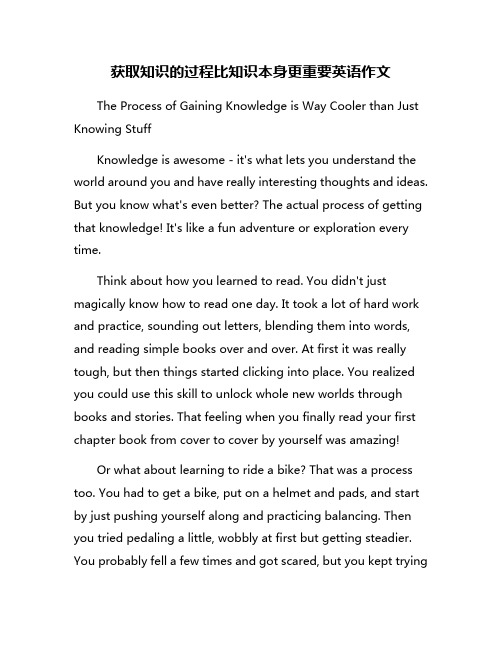
获取知识的过程比知识本身更重要英语作文The Process of Gaining Knowledge is Way Cooler than Just Knowing StuffKnowledge is awesome - it's what lets you understand the world around you and have really interesting thoughts and ideas. But you know what's even better? The actual process of getting that knowledge! It's like a fun adventure or exploration every time.Think about how you learned to read. You didn't just magically know how to read one day. It took a lot of hard work and practice, sounding out letters, blending them into words, and reading simple books over and over. At first it was really tough, but then things started clicking into place. You realized you could use this skill to unlock whole new worlds through books and stories. That feeling when you finally read your first chapter book from cover to cover by yourself was amazing!Or what about learning to ride a bike? That was a process too. You had to get a bike, put on a helmet and pads, and start by just pushing yourself along and practicing balancing. Then you tried pedaling a little, wobbly at first but getting steadier. You probably fell a few times and got scared, but you kept tryinguntil you could cruise around on two wheels! Now you have a fun skill for life that lets you exercise and explore outdoors.Every time you learn something new, whether it's skills like reading and biking or facts about science, math, history and other subjects, there's an exciting process of struggling, making mistakes, pushing yourself, and finally having that "aha!" moment when it all comes together. That whole journey is so much more memorable and meaningful than just being told the information directly.Imagine if you didn't have to go through that process to learn things. What if you could just automatically download knowledge about any topic into your brain instantly? At first, that might sound really cool and convenient. But I think it would actually be pretty boring!Part of what makes gaining knowledge so fun is being an explorer and figuring things out step-by-step. You get to be curious, ask questions, try different strategies, and feel proud when you persist through challenges. When you just get the facts handed to you, you don't get that same feeling of accomplishment and excitement.The process also helps the knowledge stick in your brain way better. Think about that first chapter book you read all byyourself - you'll probably never forget the sense of achievement from finally reading it cover to cover. Or how about when you first rode a bike without traning wheels and felt the wind in your face? Those experiences and memories from the learning process make the knowledge more meaningful and unforgettable.But when you just download facts instantly, it's like they go in one ear and out the other. The knowledge doesn't have those emotional memories attached to it, so your brain doesn't prioritize holding onto it as much. You just kind of forget it pretty quickly.The process of struggling towards understanding also gives you great life skills like problem-solving, persistence, dealing with frustration, creative thinking, and believing in yourself. Those resilient learning skills and mindsets will help you immensely as you keep growing and tackling bigger challenges throughout school and your whole future.Just getting the facts and knowledge handed to you doesn't give you a chance to practice those crucial abilities. You'd miss out on so many invaluable experiences and opportunities for personal growth that come from the learning process itself.Now, please don't get me wrong - knowledge itself is wildly important too! Having a strong base of knowledge about all sorts of topics gives you understanding, wisdom, and so many more opportunities in life. And thank goodness we don't actually have to painstakingly re-discover or re-learn every single thing ourselves - we get to build upon the knowledge that brilliant scientists, inventors, writers, and thinkers throughout human history have already established.We just have to recognize that simply absorbing information is hardly the end goal. The knowledge is incredibly valuable, but the process of gaining it is where so much of the real magic happens. It's that rewarding, rich experience of overcoming obstacles, activating our curiosity, and discovering new ideas for ourselves that makes learning so captivating and empowering.So yes, let's absolutely appreciate all the incredible knowledge humankind has discovered so far and keep adding to that understanding every single day. But let's make sure we never lose sight of just how special and irreplaceable the process of learning is too. It's not just a means to an end, but every bit as important as the end result of what we know.Embrace every opportunity you get to explore, question, struggle, fail, persist, and finally succeed at acquiring newknowledge and skills. Those vital experiences don't just help you learn - they shape you as a person, building qualities like resilience, problem-solving abilities, and self-confidence that will lead to your greatest achievements and happiness. The thrill and personal growth that comes from the learning process itself? Now that's some truly essential knowledge that will serve you well forever.。
知识源于怀疑英语作文
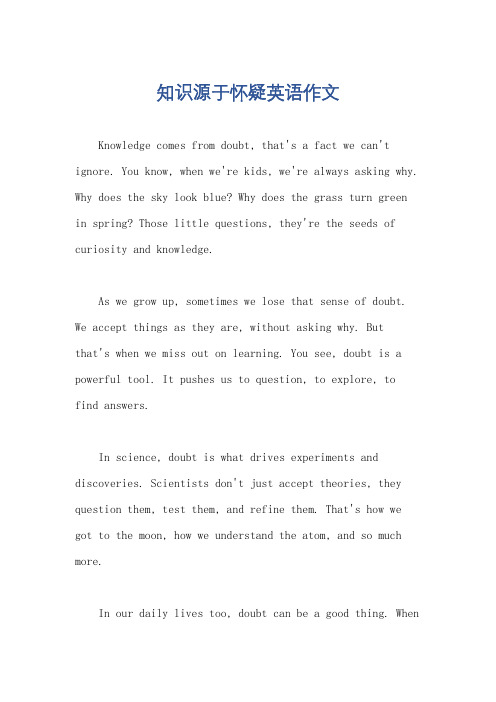
知识源于怀疑英语作文Knowledge comes from doubt, that's a fact we can't ignore. You know, when we're kids, we're always asking why. Why does the sky look blue? Why does the grass turn greenin spring? Those little questions, they're the seeds of curiosity and knowledge.As we grow up, sometimes we lose that sense of doubt. We accept things as they are, without asking why. Butthat's when we miss out on learning. You see, doubt is a powerful tool. It pushes us to question, to explore, tofind answers.In science, doubt is what drives experiments and discoveries. Scientists don't just accept theories, they question them, test them, and refine them. That's how we got to the moon, how we understand the atom, and so much more.In our daily lives too, doubt can be a good thing. Whenyou're not sure about something, you look for information, you ask people, you dig deeper. And in that process, you learn. You gain new insights, new perspectives, new knowledge.So don't be afraid to doubt. Embrace it, use it as a compass to guide your journey of learning. Because in the end, it's not just about knowing the answers, it's about the journey of discovery that leads us there.。
知识来源不尽相同英文作文
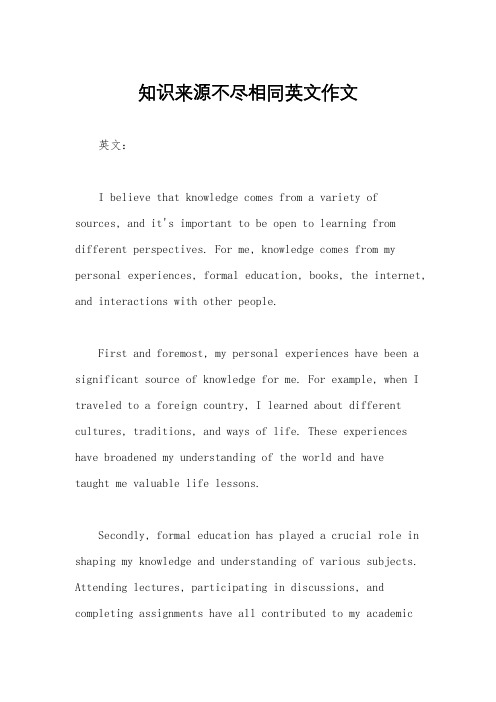
知识来源不尽相同英文作文英文:I believe that knowledge comes from a variety of sources, and it's important to be open to learning from different perspectives. For me, knowledge comes from my personal experiences, formal education, books, the internet, and interactions with other people.First and foremost, my personal experiences have been a significant source of knowledge for me. For example, when I traveled to a foreign country, I learned about different cultures, traditions, and ways of life. These experiences have broadened my understanding of the world and havetaught me valuable life lessons.Secondly, formal education has played a crucial role in shaping my knowledge and understanding of various subjects. Attending lectures, participating in discussions, and completing assignments have all contributed to my academicgrowth. For instance, my history class taught me about the impact of past events on the present, while my science class helped me understand the principles of the natural world.In addition to personal experiences and formal education, books have been a rich source of knowledge for me. I have gained insights into different topics by reading a wide range of books, from fiction to non-fiction. For instance, reading historical novels has given me a deeper understanding of different time periods and cultures.Furthermore, the internet has provided me with a wealth of information on virtually any topic. I have used online resources to research and learn about everything from cooking techniques to global issues. Watching educational videos, reading articles, and participating in online forums have all contributed to my knowledge base.Lastly, interactions with other people have also been a valuable source of knowledge for me. Engaging in conversations with friends, family, and colleagues hasexposed me to diverse viewpoints and ideas. For example, discussing current events with my peers has helped me see issues from different angles and has broadened my perspective.Overall, I believe that knowledge is not limited to one source, but rather comes from a combination of personal experiences, formal education, books, the internet, and interactions with others.中文:我相信知识来自多种来源,重要的是要对不同的观点保持开放的态度。
知识来源不尽相同英文作文
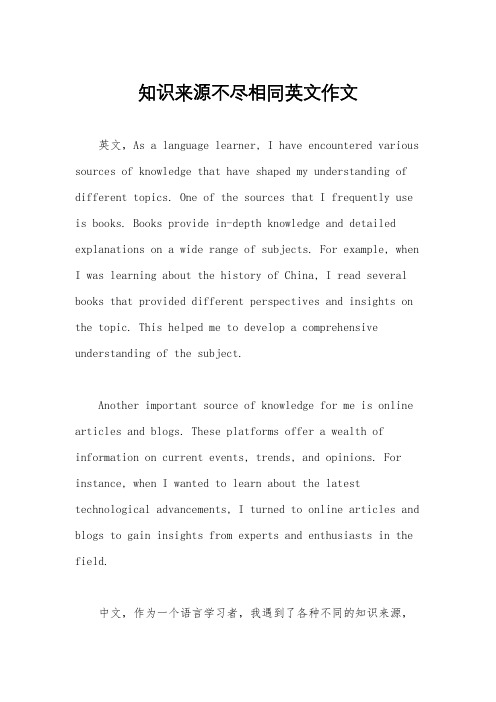
知识来源不尽相同英文作文英文,As a language learner, I have encountered various sources of knowledge that have shaped my understanding of different topics. One of the sources that I frequently use is books. Books provide in-depth knowledge and detailed explanations on a wide range of subjects. For example, when I was learning about the history of China, I read several books that provided different perspectives and insights on the topic. This helped me to develop a comprehensive understanding of the subject.Another important source of knowledge for me is online articles and blogs. These platforms offer a wealth of information on current events, trends, and opinions. For instance, when I wanted to learn about the latest technological advancements, I turned to online articles and blogs to gain insights from experts and enthusiasts in the field.中文,作为一个语言学习者,我遇到了各种不同的知识来源,这些来源塑造了我对不同主题的理解。
知识源自于质疑英语作文初中生

知识源自于质疑英语作文初中生Knowledge Stems from QuestioningCuriosity and inquisitiveness are fundamental traits that drive the pursuit of knowledge. From a young age, individuals are naturally inclined to ask questions, to explore the world around them, and to seek a deeper understanding of the phenomena they encounter. This innate desire to learn and discover is the foundation upon which knowledge is built.In the context of education, particularly at the middle school level, the ability to question and critically examine information is of paramount importance. At this stage, students are not merely passive recipients of knowledge; rather, they are actively engaged in the process of learning, challenging preconceptions, and developing their own perspectives.One of the key benefits of fostering a culture of questioning in the classroom is that it encourages students to think independently and develop critical thinking skills. When students are encouraged to ask questions, they are forced to confront their own assumptions, consider alternative viewpoints, and engage in a deeper level ofanalysis. This process not only enhances their understanding of the subject matter but also prepares them for the demands of higher education and the workforce, where the ability to think critically and solve complex problems is highly valued.Moreover, the act of questioning can lead to the discovery of new insights and the expansion of existing knowledge. By challenging the status quo and exploring uncharted territories, students can uncover innovative solutions to problems, identify previously overlooked connections, and contribute to the advancement of human understanding. This process of discovery is the lifeblood of scientific and academic progress, as it drives the continuous evolution of knowledge.In the context of middle school education, the cultivation of a questioning mindset is particularly crucial. At this stage, students are undergoing significant cognitive and emotional development, and their ability to engage in critical thinking can have a profound impact on their future academic and personal success. By encouraging students to ask questions, educators can foster a learning environment that is dynamic, engaging, and conducive to the development of essential skills.One effective strategy for promoting a questioning culture in the classroom is to create opportunities for students to activelyparticipate in the learning process. This can involve activities such as Socratic seminars, where students engage in guided discussions and pose questions to one another; problem-based learning, where students work collaboratively to solve real-world problems; and project-based learning, where students design and execute their own research projects.Additionally, educators can model the process of questioning by demonstrating their own curiosity and willingness to explore new ideas. By sharing their own thought processes, acknowledging the limitations of their knowledge, and inviting students to challenge their perspectives, teachers can inspire a sense of intellectual curiosity and empower students to take an active role in their own learning.Furthermore, the integration of technology in the classroom can also facilitate the questioning process. With access to a wealth of information and resources at their fingertips, students can delve deeper into topics, cross-reference multiple sources, and engage in independent research to validate or refute their initial assumptions.In conclusion, the ability to question and critically examine information is a fundamental aspect of the learning process. By cultivating a culture of questioning in the middle school classroom, educators can empower students to become active and engagedlearners, capable of navigating the complexities of the modern world and contributing to the ongoing expansion of human knowledge. Through this approach, students can develop the skills and mindset necessary to thrive in an ever-changing global landscape, where the ability to think critically and solve problems is the key to success.。
知识来自于什么英文作文

知识来自于什么英文作文Knowledge comes from various sources such as books, experiences, conversations, and observations. It is the accumulation of information and understanding that we gain through learning and exploration.Learning from books is a traditional and effective way to acquire knowledge. Books provide us with in-depth information on a wide range of topics, allowing us to delve into specific areas of interest and gain expertise.Experiences play a crucial role in shaping our knowledge. Through firsthand experiences, we learnpractical skills, gain insights, and develop a deeper understanding of the world around us.Conversations with others expose us to different perspectives and ideas, broadening our knowledge and challenging our existing beliefs. Engaging in meaningful discussions can lead to new discoveries and a morecomprehensive understanding of various subjects.Observations enable us to learn from the world around us. By paying attention to our surroundings, we can gather valuable information and draw conclusions based on what we see and experience.In conclusion, knowledge is a product of diverse sources, including books, experiences, conversations, and observations. It is through the combination of these sources that we expand our understanding of the world and continue to grow intellectually.。
知识的源头不是什么而是什么呢英语作文

知识的源头不是什么而是什么呢英语作文英文回答:Knowledge is not a mere accumulation of facts and figures, but rather a profound tapestry woven from the intricate threads of reason, experience, and intuition. It is not a passive receptacle, but an active force that shapes our perceptions, fuels our aspirations, and guides our actions. While books may provide us with the raw materials of knowledge, the true source lies within ourselves in the depths of our minds and the boundless realm of our consciousness.Knowledge is not a static entity, but a dynamic force that evolves and transforms in response to the ever-changing landscape of the world around us. It is not something that can be imparted from one mind to another, but rather a journey of discovery that each individual must embark upon for themselves. True knowledge, therefore, is not confined to the pages of books or the hallowed halls ofacademia, but resides in the very fabric of our being.中文回答:知识不是简单的知识和数据的积累,而是从理性的思考、经验和直觉中交织成的一块深奥的挂毯,这不是一个消极的容器,而是一种积极的力量,塑造着我们的认知,激发着我们的抱负,并指导着我们的行动。
知识源自于质疑英语作文初中
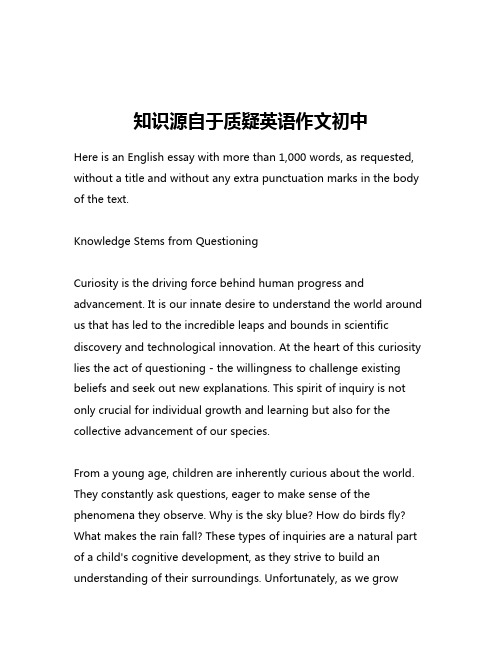
知识源自于质疑英语作文初中Here is an English essay with more than 1,000 words, as requested, without a title and without any extra punctuation marks in the body of the text.Knowledge Stems from QuestioningCuriosity is the driving force behind human progress and advancement. It is our innate desire to understand the world around us that has led to the incredible leaps and bounds in scientific discovery and technological innovation. At the heart of this curiosity lies the act of questioning - the willingness to challenge existing beliefs and seek out new explanations. This spirit of inquiry is not only crucial for individual growth and learning but also for the collective advancement of our species.From a young age, children are inherently curious about the world. They constantly ask questions, eager to make sense of the phenomena they observe. Why is the sky blue? How do birds fly? What makes the rain fall? These types of inquiries are a natural part of a child's cognitive development, as they strive to build an understanding of their surroundings. Unfortunately, as we growolder, this innate curiosity is often stifled by the educational systems and societal pressures that emphasize conformity and the regurgitation of facts over independent thinking.However, it is essential that we nurture and preserve this spirit of questioning throughout our lives. Questioning is not a sign of ignorance or weakness; rather, it is a testament to our desire to learn and grow. It is the foundation upon which all scientific progress and human understanding is built. After all, some of the most groundbreaking discoveries in history have stemmed from individuals who were willing to challenge the status quo and explore alternative explanations.Take, for example, the work of Galileo Galilei, the renowned Italian astronomer and physicist. In the early 17th century, Galileo's observations through his telescope led him to question the prevailing Ptolemaic model of the universe, which placed the Earth at the center of the cosmos. Galileo's findings, which supported the Copernican model of a sun-centered solar system, were met with fierce opposition from the Catholic Church and the scientific establishment of the time. But Galileo persisted in his questioning, ultimately contributing to a paradigm shift in our understanding of the universe.Similarly, the theory of evolution, proposed by Charles Darwin, was aradical departure from the widely accepted belief in the divine creation of species. Darwin's extensive observations and experiments led him to question the immutability of species, challenging the dominant religious and scientific views of his era. His willingness to question and explore alternative explanations, despite the social and political backlash, paved the way for a profound transformation in our understanding of the natural world.The history of science is replete with such examples, where groundbreaking discoveries have been made by individuals who were willing to challenge the accepted wisdom of their time. From the development of the germ theory of disease to the discovery of the structure of DNA, the advancement of human knowledge has been driven by a relentless pursuit of questioning and the exploration of new possibilities.But the importance of questioning extends far beyond the realm of science. In our daily lives, the ability to question and think critically is essential for personal growth, problem-solving, and effective decision-making. When we question our own beliefs, assumptions, and biases, we open ourselves up to new perspectives and the possibility of learning and evolving. This is particularly important in an age where we are constantly bombarded with information, much of which may be biased, misleading, or even outright false.By cultivating a habit of questioning, we can develop the critical thinking skills necessary to navigate the complexities of the modern world. We can learn to scrutinize the information we encounter, to seek out multiple sources, and to challenge the narratives presented to us. This, in turn, empowers us to make more informed and thoughtful decisions, whether in our personal or professional lives.Moreover, the act of questioning can foster a deeper understanding and appreciation of the world around us. When we question the underlying reasons and mechanisms behind the phenomena we observe, we gain a more nuanced and comprehensive understanding of the world. This, in turn, can lead to greater empathy, compassion, and a willingness to engage in constructive dialogue and problem-solving.In an increasingly polarized and divided world, the ability to question and engage in respectful discourse is more important than ever. By embracing a spirit of inquiry and a willingness to consider alternative perspectives, we can foster greater understanding and collaboration, ultimately leading to more sustainable and equitable solutions to the complex challenges we face as a global community.In conclusion, knowledge and progress stem from the willingness to question and explore. Whether in the realm of science, personal growth, or social discourse, the act of questioning is the foundationupon which we build our understanding of the world and our ability to effect positive change. By nurturing this spirit of inquiry from a young age and throughout our lives, we can unlock the true potential of human learning and development, and contribute to the continued advancement of our species.。
知识来源不尽相同英文作文
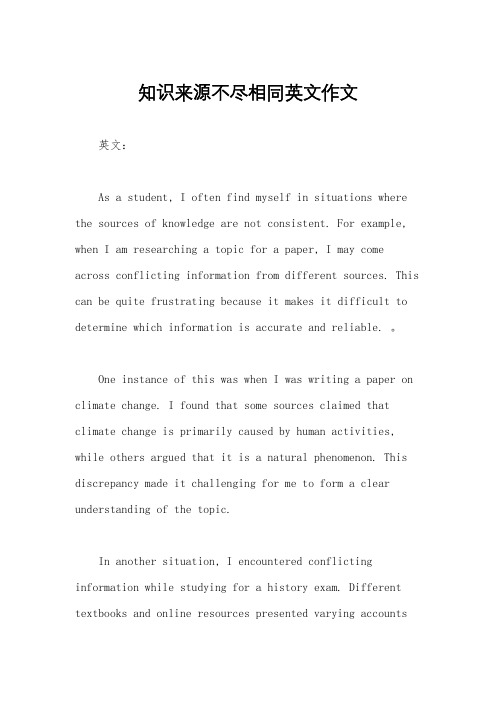
知识来源不尽相同英文作文英文:As a student, I often find myself in situations where the sources of knowledge are not consistent. For example, when I am researching a topic for a paper, I may come across conflicting information from different sources. This can be quite frustrating because it makes it difficult to determine which information is accurate and reliable. 。
One instance of this was when I was writing a paper on climate change. I found that some sources claimed that climate change is primarily caused by human activities, while others argued that it is a natural phenomenon. This discrepancy made it challenging for me to form a clear understanding of the topic.In another situation, I encountered conflicting information while studying for a history exam. Different textbooks and online resources presented varying accountsof historical events, leaving me uncertain about which version to believe.中文:作为一名学生,我经常发现自己在知识来源上存在不一致的情况。
知识源于问题英语作文中间部分

知识源于问题英语作文中间部分Q: Where does knowledge come from?A: Knowledge comes from a variety of sources, including experience, observation, education, and exploration.Q: What role does curiosity play in gaining knowledge?A: Curiosity plays a crucial role in gaining knowledge, as it motivates individuals to seek out new information and explore the world around them. Without curiosity, people may be content with what they already know and not seek to learn more.Q: How does critical thinking contribute to knowledge acquisition?A: Critical thinking is essential in knowledge acquisition because it allows individuals to analyze and evaluate information, identify biases and assumptions, and make informed decisions based on evidence. Without critical thinking, people may accept information without questioning its validity or accuracy.Q: Can technology help us gain knowledge? How?A: Yes, technology can help us gain knowledge in many ways. For example, we can use the internet and digital resources to access vast amounts of information on any topic. We can also use technology to connect with experts and peers around the world, collaborate on projects, and share knowledge and ideas.Q: How important is collaboration in gaining knowledge?A: Collaboration is crucial in gaining knowledge because it allows individuals to share ideas, perspectives, and expertise. By working together, people can learn from one another and develop new insights and solutions that might not be possible on their own.中文翻译:问:知识从哪里来?答:知识来源于多种渠道,包括经验、观察、教育和探索等。
读书增见识的英语作文
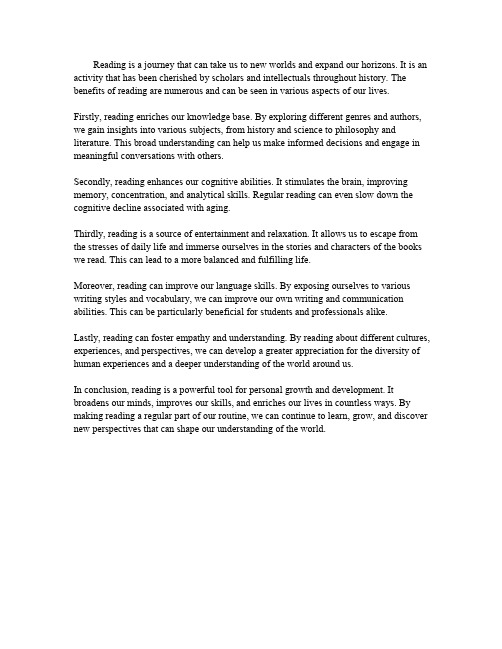
Reading is a journey that can take us to new worlds and expand our horizons.It is an activity that has been cherished by scholars and intellectuals throughout history.The benefits of reading are numerous and can be seen in various aspects of our lives.Firstly,reading enriches our knowledge base.By exploring different genres and authors, we gain insights into various subjects,from history and science to philosophy and literature.This broad understanding can help us make informed decisions and engage in meaningful conversations with others.Secondly,reading enhances our cognitive abilities.It stimulates the brain,improving memory,concentration,and analytical skills.Regular reading can even slow down the cognitive decline associated with aging.Thirdly,reading is a source of entertainment and relaxation.It allows us to escape from the stresses of daily life and immerse ourselves in the stories and characters of the books we read.This can lead to a more balanced and fulfilling life.Moreover,reading can improve our language skills.By exposing ourselves to various writing styles and vocabulary,we can improve our own writing and communication abilities.This can be particularly beneficial for students and professionals alike.Lastly,reading can foster empathy and understanding.By reading about different cultures, experiences,and perspectives,we can develop a greater appreciation for the diversity of human experiences and a deeper understanding of the world around us.In conclusion,reading is a powerful tool for personal growth and development.It broadens our minds,improves our skills,and enriches our lives in countless ways.By making reading a regular part of our routine,we can continue to learn,grow,and discover new perspectives that can shape our understanding of the world.。
课本知识和亲身经历,孰轻孰重英语作文
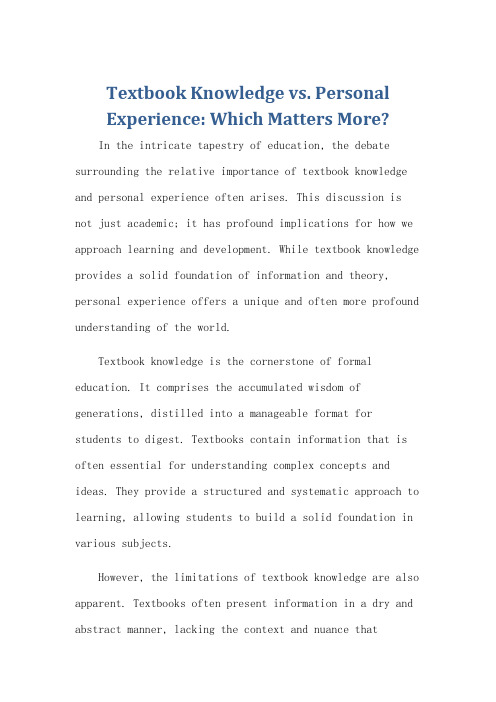
Textbook Knowledge vs. PersonalExperience: Which Matters More?In the intricate tapestry of education, the debate surrounding the relative importance of textbook knowledge and personal experience often arises. This discussion is not just academic; it has profound implications for how we approach learning and development. While textbook knowledge provides a solid foundation of information and theory, personal experience offers a unique and often more profound understanding of the world.Textbook knowledge is the cornerstone of formal education. It comprises the accumulated wisdom of generations, distilled into a manageable format for students to digest. Textbooks contain information that is often essential for understanding complex concepts and ideas. They provide a structured and systematic approach to learning, allowing students to build a solid foundation in various subjects.However, the limitations of textbook knowledge are also apparent. Textbooks often present information in a dry and abstract manner, lacking the context and nuance thatpersonal experience can provide. They may also lag behind the rapid pace of technological and scientific advancements, rendering some of the content outdated. Furthermore, textbook knowledge is often passive; it requires studentsto absorb information rather than actively engage with it.On the other hand, personal experience is a powerfultool for learning and understanding. Through personal experience, we gain a deeper and more meaningful understanding of the world. We learn by doing, by trial and error, and by interacting with the environment. Personal experience allows us to connect abstract concepts to real-world situations, making the learning process more engaging and memorable.Moreover, personal experience fosters creativity and critical thinking. As we encounter new situations and challenges, we are forced to think outside the box and find innovative solutions. This process not only enhances our cognitive abilities but also helps us develop a more nuanced understanding of the world.However, personal experience also has its limitations.It can be subjective and biased, influenced by our ownpreconceptions and perspectives. Additionally, personal experience is often limited to our own immediate surroundings and may not provide a comprehensive understanding of larger systems or global issues.In conclusion, the relative importance of textbook knowledge and personal experience depends on the context and the learning objectives. Textbook knowledge provides a solid foundation of information and theory, while personal experience offers a deeper and more meaningful understanding of the world. Both have their strengths and limitations, and the ideal approach is to strike a balance between them.By combining textbook knowledge with personal experience, students can develop a more comprehensive and nuanced understanding of the world. They can use the information and theory learned from textbooks as a starting point and then explore and apply these concepts through personal experience. This integrated approach fosters a deeper understanding of complex issues, enhances critical thinking skills, and prepares students to navigate the challenges of the real world.**课本知识与亲身经历:孰轻孰重?**在教育的复杂织锦中,关于课本知识与亲身经历相对重要性的讨论常常浮出水面。
知识来源不尽相同英文作文
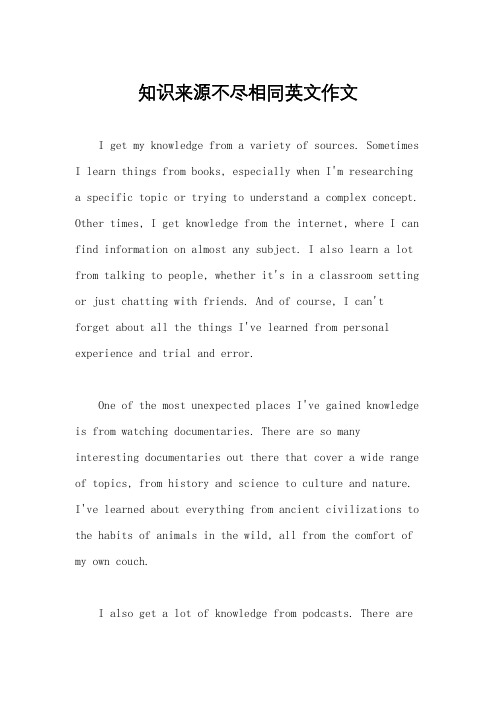
知识来源不尽相同英文作文I get my knowledge from a variety of sources. SometimesI learn things from books, especially when I'm researchinga specific topic or trying to understand a complex concept. Other times, I get knowledge from the internet, where I can find information on almost any subject. I also learn a lot from talking to people, whether it's in a classroom setting or just chatting with friends. And of course, I can'tforget about all the things I've learned from personal experience and trial and error.One of the most unexpected places I've gained knowledge is from watching documentaries. There are so many interesting documentaries out there that cover a wide range of topics, from history and science to culture and nature. I've learned about everything from ancient civilizations to the habits of animals in the wild, all from the comfort of my own couch.I also get a lot of knowledge from podcasts. There areso many podcasts out there on every subject imaginable, and I love listening to them while I'm driving or doing chores around the house. It's a great way to absorb information without having to set aside dedicated time for learning.I can't forget about the knowledge I've gained from traveling. Experiencing different cultures and seeing the world has taught me so much about history, geography, and human behavior. It's one thing to read about a place in a book, but actually being there and immersing yourself in the culture is a whole different experience.Lastly, I've gained a lot of knowledge from my own mistakes. Sometimes the best way to learn something is to mess up and then figure out how to fix it. I've learned valuable lessons from failures and setbacks that have shaped my understanding of the world and how to navigate through it.。
- 1、下载文档前请自行甄别文档内容的完整性,平台不提供额外的编辑、内容补充、找答案等附加服务。
- 2、"仅部分预览"的文档,不可在线预览部分如存在完整性等问题,可反馈申请退款(可完整预览的文档不适用该条件!)。
- 3、如文档侵犯您的权益,请联系客服反馈,我们会尽快为您处理(人工客服工作时间:9:00-18:30)。
401
Hydrogen/air supersonic combustion for future hypersonic vehicles Original Research Article
International Journal of Hydrogen Energy, In Press, Corrected Proof, Available online 18 July 2011
Journal of Power Sources, Volume 180, Issue 1, 15 May 2008, Pages 402-409
H.K. Ma, S.H. Huang, B.R. Chen, L.W. Cheng
Close preview | Related articles | Related reference work articles AbstractAbstract | Figures/TablesFigures/Tables | ReferencesReferencesAbstract
5. Conclusions
Acknowledgements
References Purchase
$ 39.95
403
Wettability and capillary behavior of fibrous gas diffusion media for polymer electrolyte membrane fuel cells Original Research Article
solid oxide (11)
air quality (10)
sofc stack (9)
current density (8)
diesel fuel (8)
flow field (7)
equivalence ratio (6)
gas turbine (6)
402
Numerical study of a novel micro-diaphragm flow channel with piezoelectric device for proton exchange membrane fuel cells Original Research Article
hydrogen (6)
ysz (6)
burning velocity (5)
view more
Year
2011 (175)
2010 (137)
2009 (114)
2008 (114)
2007 (95)
| | Open all previews Sort by: Relevance - selected | Date
$ 31.50
Highlights
? H2 supersonic combustion is studied by means of LES of the Hyshot II scramjet. ? The baroclinic term, enhanced by H2 low density, drives vorticity production. ? H2/air combustion is predicted very fast with a combustion efficiency of 87.65%.
D. Cecere, A. Ingenito, E. Giacomazzi, L. Romagnosi, C. Bruno
Close preview | Related articles | Related reference work articles LOADING.... Purchase
635 articles found for: pub-date > 1987 and tak((Aerospace or aircraft or carrier or Submarine or airship or air or cushion or challenge or inovation or rocket) and (ship or Engine or fuel or army or Thrust or solder or commander or communicat or afterburning or turbofan) and (Engine or design or jeep or officer or gun or Manufactur or parts or fleet or sumerine or discover or find or hunt or installation)) AND LIMIT-TO(smi, "5269,5729,6055,5726,5679","Journal of Power Sources,International Journal of Hydrogen Energy,Atmospheric Environment,Fuel,Acta Astronautica") AND LIMIT-TO(pubyr, "2011,2010,2009,2008,2007") Edit this search | Save this search | Save as search alert | RSS Feed Font Size:
Topic
fuel cell (142)
nox emission (39)
pem fuel (30)
natural gas (18)
sofc (18)
nox (15)
oxide fuel (13)
air craft (12)
diesel engine (12)
Journal of Power Sources, Volume 194, Issue 1, 20 October 2009, Pages 433-444
Jeff T. Gostick, Marios A. Ioannidis, Michael W. Fowler, Mark D. Pritzker
International Journal of Hydrogen Energy, Volume 35, Issue 7, April 2010, Pages 2698-2702
Xiao-guang Li, Liu-lin Cao, Zhi-xiang Liu, Cheng Wang
Previous studies have shown that the amplitude of the vibration of a piezoelectric (PZT) device produces an oscillating flow that changes the chamber volume along with a curvature variation of the diaphragm. In this study, an actuating micro-diaphragm with piezoelectric effects is utilized as an air-flow channel in proton exchange membrane fuel cell (PEMFC) systems, called PZT-PEMFC. This newly designed gas pump, with a piezoelectric actuation structure, can feed air into the system of an air-breathing PEMFC. When the actuator moves outward to increase the cathode channel volume, the air is sucked into the chamber; moving inward decreases the channel's volume and thereby compresses air into the catalyst layer and enhancing the chemical reaction. The air-standard PZT-PEMFC cycle is proposed to describe an air-breathing PZT-PEMFC. A novel design for PZT-PEMFCs has been proposed and a three-dimensional, transitional model has been successfully built to account for its major phenomena and performance. Moreover, at high frequencies, PZT actuation leads to a more stable current output, more drained water, higher sucked air, higher hydrogen consumption, and also overcomes concentration losses.
ቤተ መጻሕፍቲ ባይዱ
| Page of 7 | = Full-text available = Abstract only
Search within results
Refine results
Content Type
Journal (635)
Journal/Book Title
Close preview | Related articles | Related reference work articles LOADING.... Purchase
